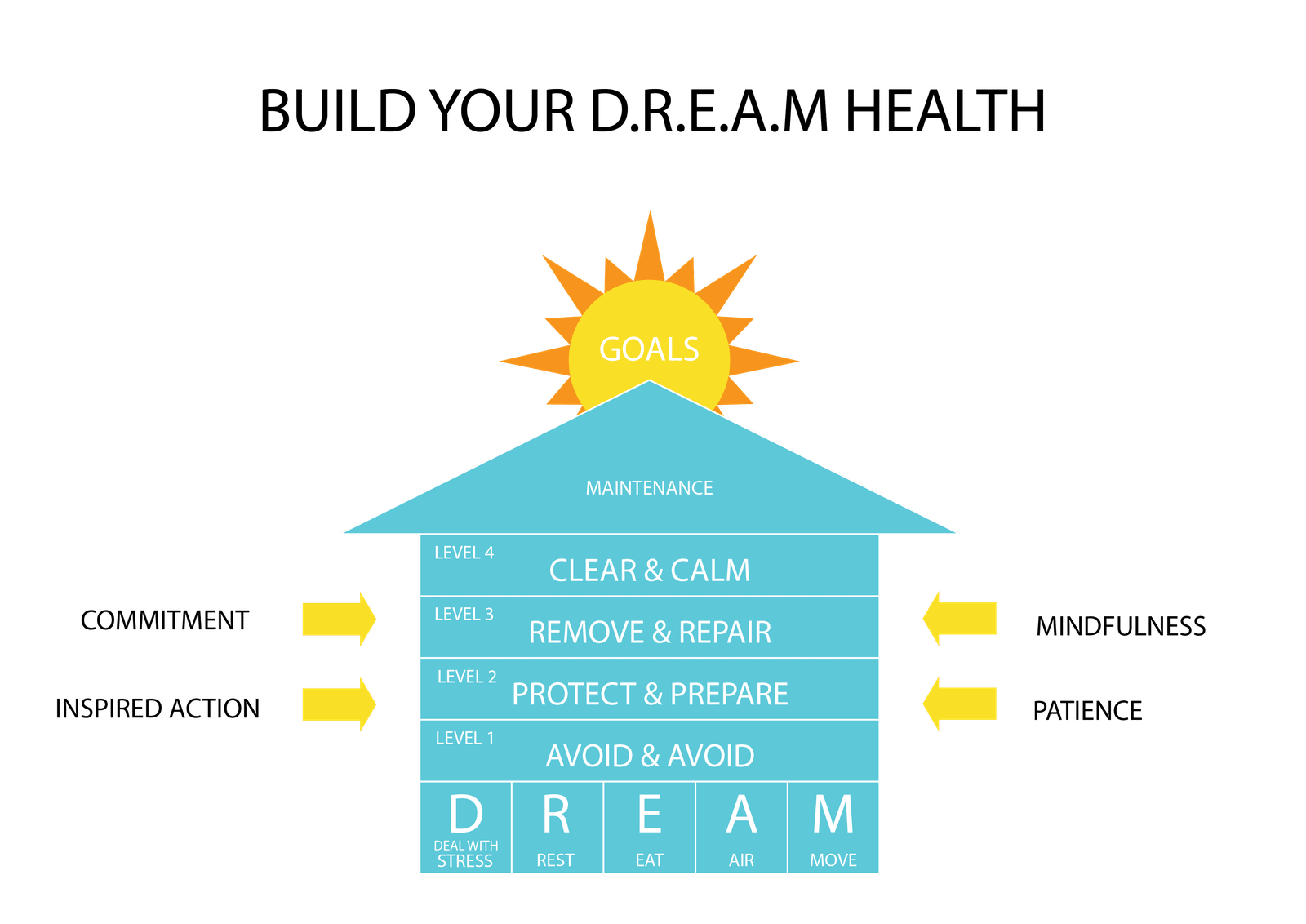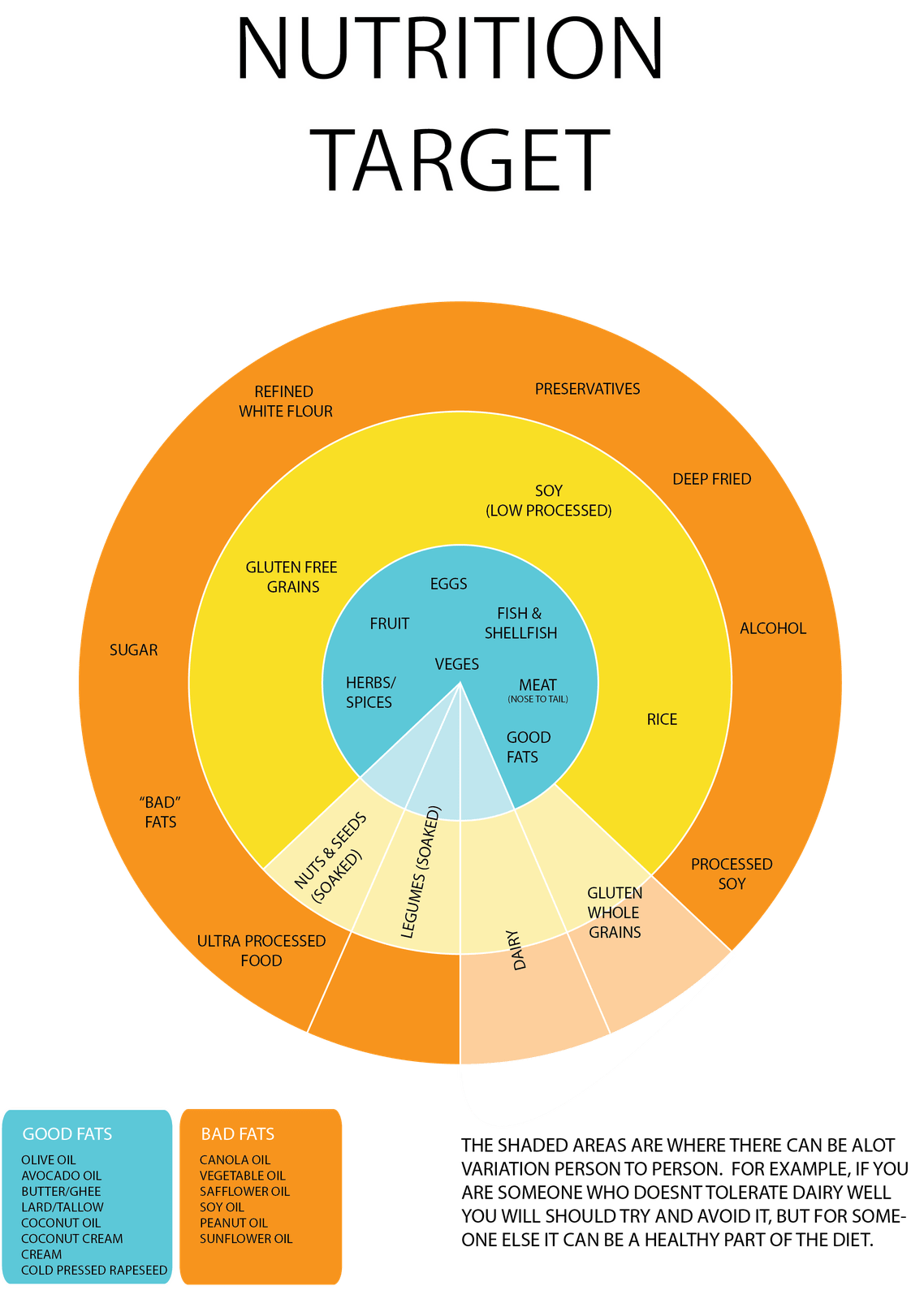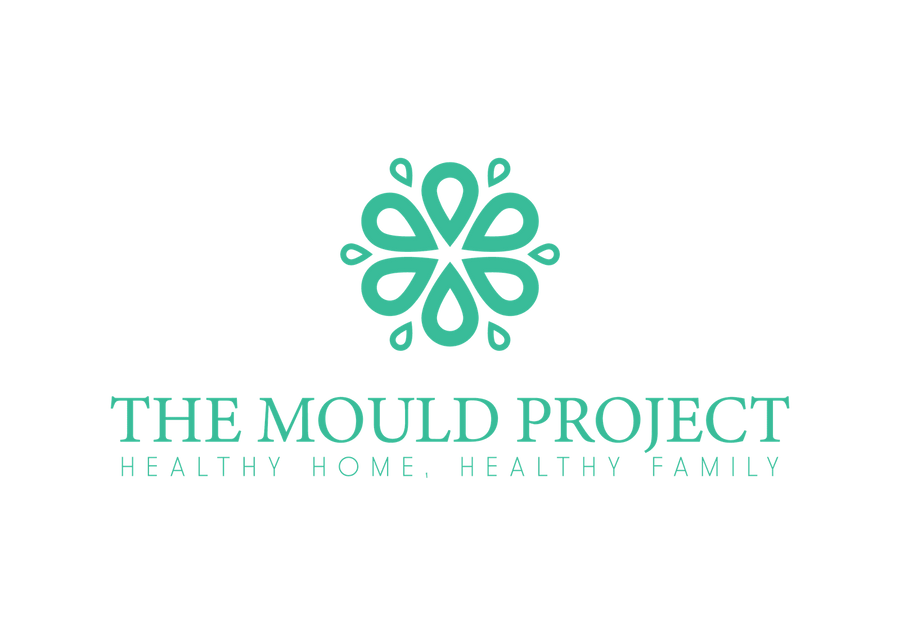

Building, or re-building, your health needs a solid foundation. We created this model when we had a physiotherapy and health clinic- and the same principles apply when working with mould illness (with a few tweaks)
These foundational principles are well known, and for a good reason. Sleep, stress reduction, nutrition and exercise each has a ton of research backing up its importance to health. While you dont have to aim for perfection, the more you can get these elements in place, the more effective the rest of the steps will be. Although supplements and the other tools discussed here are very important, you can't supplement your way out of a crappy diet and lifestyle.

Deal with Stress
While a certain amount of stress is benefical for our health, the constant prolonged stress that many of us experience is damaging to our health. Research has shown it impacts our immune system, cardiorespiratory system, energy levels, mental health, brain function and sleep.
To add to this, being in mould messes with the HPA axis (the hormonal response to stress) resulting in a disrupted stress response. This may mean you either don't deal with stress well, or get stressed out alot easier than normal.
There is alot to look at with stress in this modern world, but it comes down to 3 basic approaches- avoiding stress, , managing stress and supporting stress.
TIPS FOR AVOIDING STRESS
- Learning to say no
- Avoiding people who stress you out
- Limit your time watching the news (and social media)
- Take it easy on yourself
- Avoid processsed, sugary foods
TIPS FOR MANAGING STRESS
- Mindfulness and mediation. There are alot of good apps and programs like headspace (link affiliate)
- Gentle breathing exercises such as Buteyko (affilate oxygen advantage)
- Gentle movement like yoga, Taichi and Qigong
- Walking or being in nature ie. beach, forest
- Taking regular breaks and planning "peace points" in your day
- BrainTap is a great program which uses neuroscience to optimize brainwaves
- Addressing trauma
SUPPORTING STRESS
While many of the above steps will help support a health stress response, there are also nutrition and supplements that can help
- Eat enough protein and fats, and the right amount of carbs for you
- Magnesium
- Adaptogenic herbs, such as Rhodiola, Ashwangda, Holy Basil and Astragalus
Rest
Rest refers to sleep, but also resting enough throughout the day.
We all know the importance of a good nights sleep. If theres one thing that has the most impact on our health, its sleep.
For some, getting consistently good sleep is mainly creating healthy sleep habits. For others, getting to sleep and staying alseep can be difficult and may may need some extra help.
TIPS FOR IMPROVING SLEEP
- Improve your circadian rhythym (see below)
- Create a consistent bedtime routine
- Reduce blue light after dark (we use blockbluelight lights)
- make your bedroom as dark as possible
- limit caffeine and alcohol intake
- manage stress during the day (see above)
- Improve your breathing, and try breathing exercises at bedtime
- Keep your bedroom cool
- Try having a hot bath before bed (a drop in body temperature helps falling asleep)
- Get outside and exercise during the day
- Smelling lavender essential oils
- Supplements such as magesium, L-theanine, 5-HTP
CIRCADIAN RHYTHYMS
Our bodies have evolved with the rhythms of nature, and being out of sync with this
has caused more stress on our bodies. These rhythms affect many processes in the body that we don’t think about-digesting food, healing,getting sleepy, hormone release and body temperature. A disrupted circadian rhythm will impact our sleep and reduce our ability to deal with
stress.
Aimto wake up at the same time each day, and expose yourself to sunlight (if
possible) as soon as you can. Light exposure is the main regulator of circadian
rhythyms. Aim to eat your meals at roughly the same time and exercise at the
same time as well. At night, reduce blue emitting light once the sun goes down
and get to bed at roughly the same time each night.
Eat (& Drink)
Eat refers to nutrition (and hydration).
Nutrition gives us the energy and building blocks to support our bodies processes, as well as heal. The basics of nutrition is fairly simple- we all know what we shouldn’t be eating (ie processed junk). Its when we get to what exactly to eat it can get confusing, and there
are a lot of different pproaches out there that can work for different people, and at different stages of healing.
We came up with the “Nutrition target” to try and simplify things. Don’t worry about being perfect, just aim for the middle area of the target and if you miss now and then use that as feedback (ie how do you feel) to take a better aim next time. By paying attention to how you feel after each meal, you can work out the nutrition that works best for you.
There are also different strategies for macronutrients ratios (ratio of protein/carbs/fats). This can depend on what you are trying to acheive, exercise levels and current health status.
Many people with mould illness are gluten intolerant, and may have other intolerances ie. Dairy, histamine, oxalates etc. Often these intolerances are a
sign of a deeper imbalance in the gut and the body, and they may be able to be reintroduced and tolerated better once you have healed.
Eating the rainbow is a good way to a lot of bioflavonoids in, which are helpful for mould. But if you find that you are reacting to a lot of these foods, you may need a simpler diet to begin with.
Hydration is also important. Spring water is the best as it contains elements which helps
you retain the water, (and is more structure) but not everyone has access to
springs. Having a good water fitlter and then adding a pinch of sea salt to your bottle or glass is another good option. Aim to drink between 1.5L-3L/day depending on your weight.

TIPS
Eat high quality protein
Eat plenty of high quality fats
Eat plenty of different colour veges
Eat fruit, but not too much
Adjust your diet to your own needs and listen to your body
Air
This refers to how we breathe, and what we are breathing
How we breathe has a massive impact on our nervous system and stress system. It
also has an impact on how we move our bodies and perceive pain (I used this a lot as a physiotherapist)
I recommend starting with some basic breathing exercises daily. Diaphragmatic, or belly breathing, is a good place to start and is has the added benefit of improving movement and pain if done well. You want the whole ribcage joining in, not just the belly. My physiotherapy mentor Zac Cupples is the man when it comes to breathing and movement, and this video explains how diaphragm breathing works, what not to do, and what to do. (Skip to 14:00 if you just want to look at the exercise).
What we breathe obviously includes mould, but also all of the other nasties that are in the indoor air. VOCs, formaldehyde,NO2,PM2.5 etc. Air pollution was estimated to cause 3300 premature deaths in NZ each year, and 7 million world wide. Surprisingly, indoor air quality is often worse than outdoor air quality due to the small areas and lack of ventilation. Use this as an excuse to get outside in some fresh air often, every day (especially if you are still living in mould). Getting outside also
means you get in the sun more which has gives you the mould-fighting benefits of UV light and vitamin D
We recommend a good air filter as one of the foundational principles- even if you aren’t dealing with mould. Either the filter can deal with all of the indoor pollutants, or your body will be the filter. Ideally, a filter should be able filter down to the mycotoxin size and also catch VOCs (gases). Our favourite is the Intellipure air filters as they
- catch ultrafine particles down to 0.007 microns (small enough for mould spores,fragments and mycotoxins)
- Uses the patented DFS system which “zaps” the filter making it more effective,
and also reducing any growth on the filter
Move
Movement has huge benefits for healing. It helps blood flow, metabolism, and detoxification by moving lymph through the body, Think of movement rather than exercises, as we have been conditioned to think that exercise needs to be hard and intense to be beneficial which isn’t the case. Many people struggling with mould illness find exercise and recovery from exercise difficult so just start where you are at.
Movement can be things like walking, gardening, bouncing on the tramp with your kids (or
yourself), biking, dancing, cleaning and swimming. There are so many ways to move, so find your own groove. As you start to feel better, slowly increase the amount of exercise you are doing. Listen to your body. A good general rule is that if it takes longer than 2 days to recover it was too intense for you.
Need help with the foundation?
Book a support call if you would like some help in implementing these foundational principles
